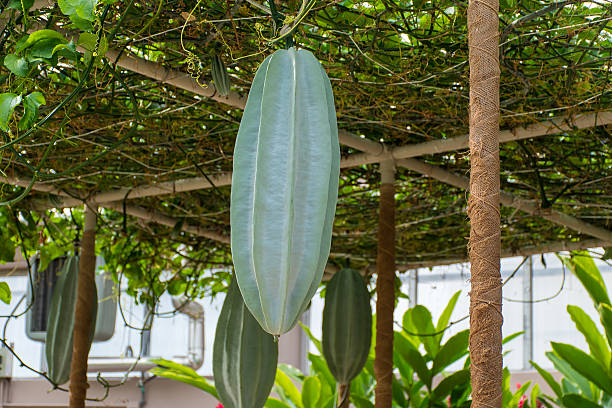Cassava is a widely grown crop in many parts of the world, and it is an essential source of food and income for millions of people.
To ensure a healthy cassava crop, it is important to provide the plant with adequate nutrients. Fertilizers are an effective way to provide the necessary nutrients to cassava, but choosing the right fertilizer can be a daunting task.
In this article, we will list the 12 best fertilizers for cassava, which include both organic and inorganic options. By using the right fertilizer, farmers can improve cassava yield, quality, and profitability.
12 Best Fertilizer For Cassava In Africa
If you are looking for the best fertilizer for cassava, simply checkout our top 12 picks below. We have compiled the list under two categories, organic and inorganic fertilizers which are best and most commonly used for cassava.
#1. Organic Fertilizer
If you are looking for a natural and sustainable way to boost the growth of your cassava plants, organic fertilizer is a great option.
Organic fertilizers are made from natural materials like compost, manure, biofertilizers, and seaweed extract, which provide essential nutrients to the soil and promote the growth of healthy cassava plants.
Read Also: 15 Best Fertilizer for Palm Oil Trees Organic & Inorganic: Boosting Growth and Yield
#1. Compost
Compost is an excellent organic fertilizer that you can easily make yourself by decomposing organic matter like food waste, leaves, grass, and other plant materials. When you use compost, you are providing your cassava plants with a nutrient-rich soil amendment that can enhance soil structure and water-holding capacity.
Compost contains essential nutrients like nitrogen, phosphorus, and potassium, which are essential for cassava growth.
Read Also: 15 Best Fertilizers for Apple and Pear Trees: Organic & Inorganic
It improves soil quality by promoting beneficial microorganisms that can help suppress plant diseases and pests.
#2. Manure
Manure is another popular organic fertilizer that farmers use to nourish their cassava plants. It is a rich source of nutrients like nitrogen, phosphorus, and potassium, which are necessary for the growth of healthy cassava plants.
Read Also: 15 Best Fertilizers for Pepper [Organic & Inorganic]
You can use different types of manure like cow, poultry, or sheep manure, depending on what is available in your area.
However, it is essential to ensure that the manure is well-rotted before using it, as fresh manure can damage your plants due to high ammonia content.
#3. Biofertilizers
Biofertilizers are another type of organic fertilizer that can benefit your cassava plants. These fertilizers contain beneficial microorganisms like bacteria, fungi, and algae that can help improve soil health and increase nutrient availability for your cassava plants.
Biofertilizers are also environmentally friendly as they help promote natural soil processes that reduce chemical use and pollution. Some examples of biofertilizers include Rhizobium, Azotobacter, and mycorrhizae.
Read Also: 15 Best Fertilizer for Rice Farm [Organic & Inorganic Fertilizers]
#4. Vermicompost
Vermicompost is a type of organic fertilizer made from worm castings. It is an excellent source of nutrients like nitrogen, phosphorus, and potassium, which are essential for cassava growth. Vermicompost also contains beneficial microorganisms that can enhance soil health and promote plant growth.
When you use vermicompost, you are providing your cassava plants with a nutrient-rich soil amendment that can improve soil structure and water-holding capacity.
Vermicompost also helps to suppress plant diseases and pests, reducing the need for chemical pesticides.
Read Also: 21 Best Fertilizer for Soybeans Organic & Inorganic: Maximizing Yield and Quality
You can make vermicompost by using a worm bin, which involves adding kitchen scraps and other organic materials to a container where worms can decompose them into castings.
Alternatively, you can purchase vermicompost from agricultural supply stores.
#5. Green Manure
Green manure is another type of organic fertilizer that can help you grow healthy cassava plants. It involves planting cover crops like legumes, grasses, or other plants, then tilling them back into the soil while they are still green.
Green manure crops help to improve soil fertility by adding organic matter and nutrients back into the soil. They also help to suppress weeds, prevent soil erosion, and improve soil structure and water-holding capacity.
Read Also: 15 Best Fertilizers for Okra Farms [Organic & Inorganic]
Examples of green manure crops that you can use for cassava farming include cowpeas, soybeans, alfalfa, and clover. By using green manure, you can improve your soil quality and grow healthy, robust cassava plants.
#6. Seaweed Extract
Green manure is another type of organic fertilizer that can help you grow healthy cassava plants. It involves planting cover crops like legumes, grasses, or other plants, then tilling them back into the soil while they are still green.
Green manure crops help to improve soil fertility by adding organic matter and nutrients back into the soil. They also help to suppress weeds, prevent soil erosion, and improve soil structure and water-holding capacity.
Read Also: 15 Best Fertilizer for Cabbage [Organic & Inorganic]
Examples of green manure crops that you can use for cassava farming include cowpeas, soybeans, alfalfa, and clover. By using green manure, you can improve your soil quality and grow healthy, robust cassava plants.
#2. Inorganic Fertilizer
Inorganic fertilizers are another type of fertilizer that you can use to grow healthy cassava plants. Unlike organic fertilizers, inorganic fertilizers are made from synthetic or chemical compounds that provide essential nutrients to your plants.
Inorganic fertilizers come in different forms, including granules, powders, and liquids.
They contain three primary macronutrients: nitrogen, phosphorus, and potassium, as well as micronutrients like zinc, iron, and copper, that are essential for plant growth and development.
Read Also: 15 Best Fertilizers for Watermelon: Organic & Inorganic
When using inorganic fertilizer, it’s important to follow the manufacturer’s instructions carefully to avoid over-fertilizing your cassava plants, which can lead to nutrient imbalances and plant stress.
Inorganic fertilizers can also have a negative impact on the environment if not used correctly.
While inorganic fertilizers can be effective at promoting plant growth, they should be used in moderation and with caution.
#1. Nitrogen Fertilizers (Urea, Ammonium Sulfate, And Ammonium Nitrate)
Nitrogen is an essential nutrient for cassava plants, and nitrogen fertilizers can help promote healthy growth and high yields.
Urea, ammonium sulfate, and ammonium nitrate are some examples of nitrogen fertilizers that are commonly used in cassava farming.
Read Also: 15 Best Fertilizers for Groundnut [Organic & Inorganic]
Urea is a white crystalline solid that is highly soluble in water and can be easily applied to cassava plants. Ammonium sulfate and ammonium nitrate are also popular nitrogen fertilizers that can be used to promote healthy cassava growth.
These nitrogen fertilizers work by providing plants with the nitrogen they need to create proteins, enzymes, and other essential compounds that are important for growth and development.
#2. Phosphorus Fertilizers (Triple Superphosphate, Diammonium Phosphate, And Single Superphosphate)
Phosphorus is another essential nutrient for cassava plants, and phosphorus fertilizers can help promote strong root development, healthy growth, and high yields.
Triple superphosphate, diammonium phosphate, and single superphosphate are some examples of phosphorus fertilizers that can be used in cassava farming.
Read Also: 15 Best Fertilizers for Beans [Organic & Inorganic]
Triple superphosphate is made by treating phosphate rock with sulfuric acid, while diammonium phosphate and single superphosphate are made by treating phosphate rock with ammonia.
These fertilizers can provide plants with the phosphorus they need to create strong root systems and support healthy growth.
#3. Potassium Fertilizers (Muriate Of Potash And Potassium Sulfate)
You can use potassium fertilizers to help your plants grow strong and healthy. Muriate of Potash and Potassium Sulfate are two common types of potassium fertilizers.
Muriate of Potash contains chloride, which may not be suitable for all crops, while Potassium Sulfate contains sulfur, which can help with plant growth.
These fertilizers are water-soluble and can be easily absorbed by the plants.
#4. Dolomite
Dolomite is a type of inorganic fertilizer that can provide plants with calcium and magnesium. It can also help to balance the pH level of the soil, making it more suitable for plant growth.
Dolomite is commonly used for crops like tomatoes, peppers, and potatoes. It is slow-release, meaning it will slowly release nutrients into the soil over time.
Dolomite is usually applied to the soil before planting or during the growing season.
#5. Gypsum
Gypsum is an inorganic fertilizer that contains calcium and sulfur. You can use it to improve soil structure, as well as to add calcium to the soil.
Gypsum is beneficial for crops that require high amounts of calcium, like tomatoes and peppers. It can also help to reduce soil compaction, making it easier for roots to penetrate the soil.
Gypsum is usually applied to the soil before planting or during the growing season.
#6. Micronutrient Fertilizers (Zinc Sulfate, Copper Sulfate, And Borax)
Micronutrient fertilizers contain trace elements that are essential for plant growth. Zinc Sulfate, Copper Sulfate, and Borax are common micronutrient fertilizers that can help to prevent nutrient deficiencies in crops.
Zinc Sulfate is beneficial for crops like corn, wheat, and soybeans, while Copper Sulfate is useful for fruit trees and vineyards.
Borax is a micronutrient fertilizer that can help to improve root growth and flower development. These fertilizers are usually applied to the soil or sprayed on the plants.
Benefits of Applying Fertilizer to Cassava
- Increased yields: Fertilizer application helps to increase cassava yields, as it provides the necessary nutrients that the crop needs for growth and development.
- Improved quality: Fertilizer application can also improve the quality of cassava, by increasing the starch content and reducing the cyanide content.
- Faster maturity: Fertilizer application can help to speed up the growth and maturity of cassava, leading to earlier harvests and more efficient use of land.
Disadvantages of Applying Fertilizer to Cassava
- Cost: Fertilizers can be expensive, and the cost may outweigh the benefits if the yield increase is not significant.
- Environmental concerns: Excessive use of fertilizers can lead to soil and water pollution, which can have negative impacts on the environment and human health.
- Soil depletion: Over-reliance on fertilizers can lead to soil depletion, as the soil becomes dependent on external inputs rather than natural processes for nutrient replenishment.
How to Apply Organic fertilizer to cassava
- Prepare the soil: Clear the land and till the soil to create a good seedbed.
- Apply the fertilizer: Spread the organic fertilizer evenly across the soil surface, taking care to avoid direct contact with the cassava stems.
- Incorporate the fertilizer: Use a hoe or rake to work the fertilizer into the top 2-3 inches of soil, making sure that it is evenly distributed.
- Water the soil: Water the soil lightly after applying the fertilizer to help it soak in and begin to release its nutrients.
How to Apply Inorganic fertilizer to cassava
- Prepare the soil: Clear the land and till the soil to create a good seedbed.
- Calculate the appropriate amount of fertilizer: Consult with an agricultural extension officer or soil scientist to determine the right amount of fertilizer to apply based on the soil test results and crop requirements.
- Apply the fertilizer: Spread the inorganic fertilizer evenly across the soil surface, taking care to avoid direct contact with the cassava stems.
- Incorporate the fertilizer: Use a hoe or rake to work the fertilizer into the top 2-3 inches of soil, making sure that it is evenly distributed.
- Water the soil: Water the soil lightly after applying the fertilizer to help it soak in and begin to release its nutrients.
Factors to Consider when Choosing Fertilizer for Cassava
- Soil Test: Conduct a soil test to determine the soil nutrient content and pH level. This will guide you in selecting the right type and amount of fertilizer needed for optimal plant growth.
- Nutrient Requirements: Cassava requires specific nutrient requirements at different growth stages. Choose a fertilizer that meets these requirements.
- Organic or Inorganic Fertilizer: Choose between organic or inorganic fertilizer based on availability, cost, and preference. Organic fertilizer is usually preferred for sustainable farming practices.
When to Apply Fertilizer to Cassava
- Basal Application: Apply the fertilizer at planting or sowing to supply essential nutrients for the early growth stages of the plant.
- Topdressing Application: Apply fertilizer after the first harvest or when the plant reaches 6-8 weeks after planting.
Where to Buy Organic Fertilizer
- Local farmers’ co-operatives
- Agricultural input suppliers
- Organic fertilizer manufacturers
- Online marketplaces.
How to Get Bumper Yield in Cassava
To get a bumper yield in cassava, you need to ensure proper management practices throughout the planting period.
Start by choosing healthy cassava stems and plant them in well-prepared soil. Practice timely weeding and watering to maintain optimum soil moisture.
Also, apply the right fertilizers in the right amounts at the right time to promote growth and yield.
Fertilizer Requirement for Cassava
Cassava requires a balanced supply of nutrients, especially nitrogen, phosphorus, and potassium, for optimum growth and yield.
The fertilizer requirement for cassava depends on soil fertility, planting density, and cropping system. Soil testing can help determine the fertilizer requirement for your cassava crop.
A recommended application of 200 kg/ha NPK 15:15:15 fertilizer is appropriate for cassava.
Effect of Fertilizer on Cassava
Fertilizer has a significant effect on cassava growth and yield. The proper application of fertilizers can improve soil fertility, increase nutrient uptake, and boost crop yield.
However, an excessive application of fertilizer can lead to nutrient imbalance, soil acidity, and reduced yield.
Effect of Different Sources of Organic Manure on Growth and Yield of Cassava
The use of organic manure can improve cassava yield and soil fertility. Various organic manures such as poultry droppings, cow dung, and compost can be used.
However, the effectiveness of organic manure varies with the source and composition. Studies have shown that the use of poultry droppings and cow dung can significantly improve cassava yield.
Maturity Period of Cassava
The maturity period of cassava varies with the variety and environmental conditions. Cassava takes an average of 8 to 12 months to reach maturity after planting.
Early maturing varieties can be harvested within 6 to 8 months, while late maturing varieties may take up to 18 months to mature.
The Removal of Cowpea Seeds from Dried Pods is Called
The removal of cowpea seeds from dried pods is called threshing. Threshing can be done manually by beating the pods with a stick or mechanically by using a threshing machine.
15-15-15 Fertilizer
A balanced fertilizer with a composition of 15% nitrogen, 15% phosphorus, and 15% potassium is called 15-15-15 fertilizer. It is a popular fertilizer used for general crop production.
Cassava Harvesting
Cassava can be harvested when the leaves turn yellow and start to fall off, indicating maturity. Use a sharp machete to cut the stem about 5 cm from the ground, and then remove the tubers from the soil. The harvested tubers should be handled with care to avoid damage.
Conclusion
Choosing the right fertilizer for cassava is crucial for achieving optimal yields. The selection between organic and inorganic fertilizers depends on factors such as soil nutrient content, climate, and cost. It is recommended to test soil before applying fertilizers to ensure the right balance of nutrients.
Proper application methods and timing can also affect the effectiveness of fertilizers. With the right combination of fertilizers and proper farming techniques, farmers can achieve bumper yields of cassava and maximize their profits.



